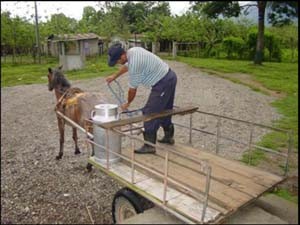
In 2000, only twenty percent of the raw milk produced in Honduras was being processed due to its poor quality resulting from inadequate on-farm milk sanitation and handling as well as a lack of cooling facilities. Farmers faced low productivity, reduced income, and severe price fluctuations as a result of this inferior milk quality.
To increase the productivity and competitiveness of Honduran dairy farmers and assist all segments of the dairy sector, USAID funded the Dairy Initiative in 2001 which organized about 200 small-sized dairy farmers into cooperatives and helped them establish thirteen milk collection centers. An important component of this project was the training and technical assistance given to producers to solve problems with milk sanitation and handling.
As a result of USAID’s work, farmers have improved the quality of their milk and overall productivity, which has led to higher and more stable prices for their cooled milk. A recent study indicates that farmers assisted by USAID have increased their incomes by an average of 346 percent.
Based upon the success of this initial effort, the initiative has now embarked upon a second phase to install forty-nine additional collection centers, which will be fully operational by September 2004. The economic effect from this initiative will be approximately $11.6 million per year in additional earnings for the farmers and the creation of about 1,600 new jobs in rural areas of Honduras.







Comment
Make a general inquiry or suggest an improvement.